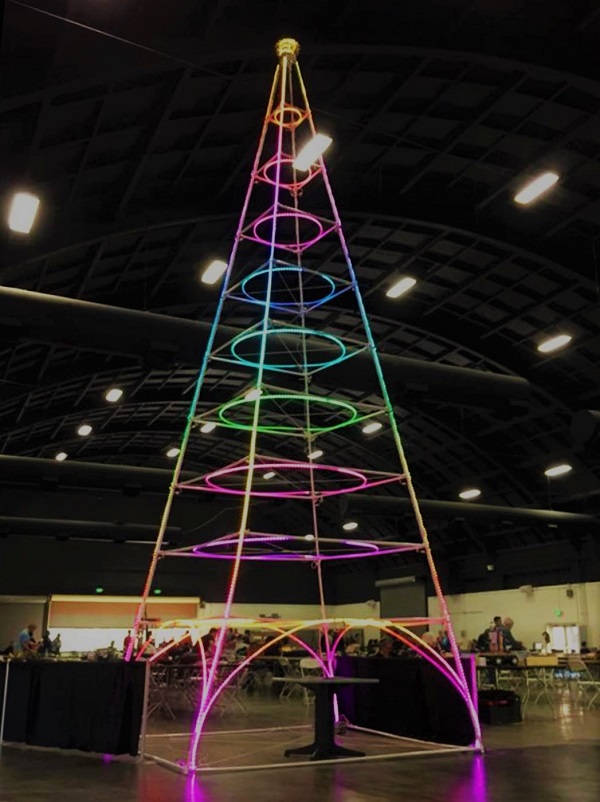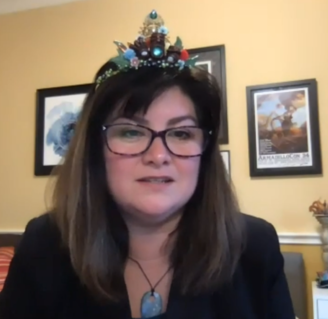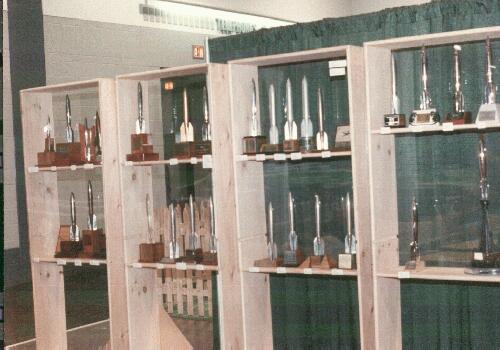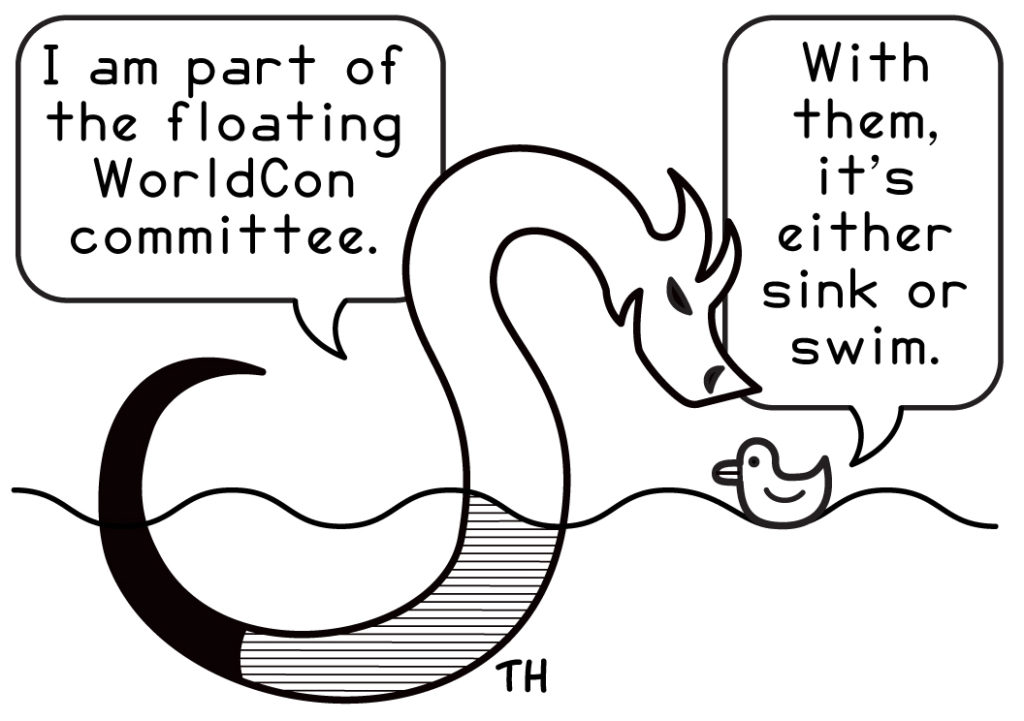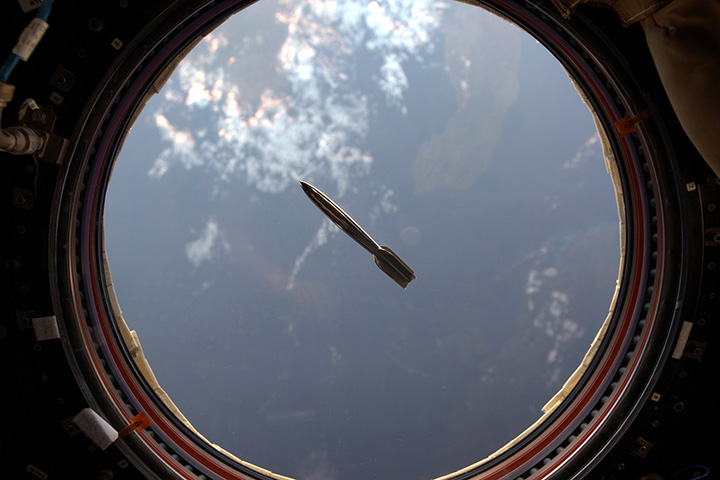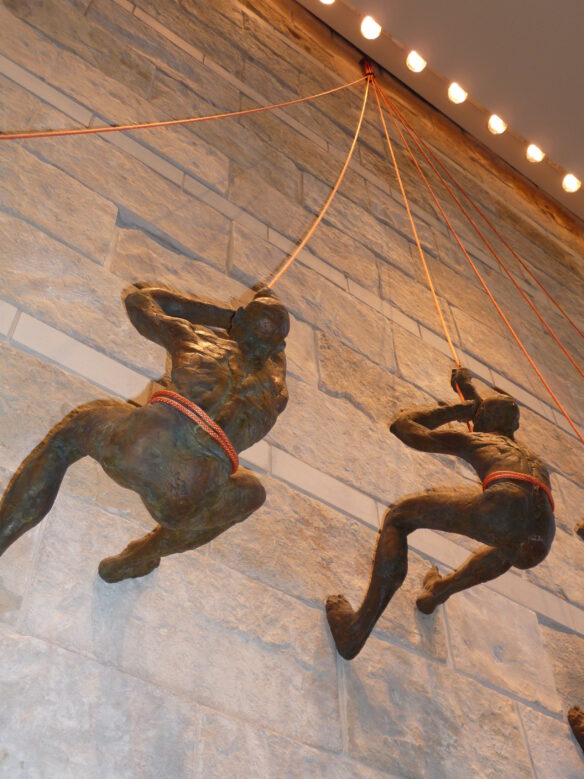
EDITOR’S INTRODUCTION: This tenth reprint from Journey Planet’s “Be the Change” issue begins with Marguerite Smith’s assessment of the attractions and drawbacks of the Worldcon community, follows with a wish list for improving the experience for participants and the committee.
By Marguerite Smith: Change is inevitable. It can be planned for or unexpected, desired or dreaded, and it can even be overlooked, but it will always be there. To bastardise Heraclitus, no fan can attend the same convention twice.

The key, then, is to plan for it. Even as a member (or attendee), you’ll have lived another year, the convention may be in a new location, new people will be involved, and new things will have arisen to discuss.
As an organiser, things are even more complicated. You are responsible for deciding the direction your convention will go, on top of building the team and convincing them to go along with you!
Everyone will have their own methods; this is only the way I’m currently thinking about it.
In my line of work, we often have to work out a plan to get from where we are to where we want to be. That means we have to have an honest look at where we currently are. These are some of the points that I see from my perspective, all horribly generalised:
- We’re a group of fans who are passionate about our interest(s).
- People who join more than one year are trying to revisit whatever spark it was that drew them in.
- As people spend longer in the community, or helping organise, the more ownership they tend to feel around the convention.
- People who volunteer really like volunteering, to see things get done or to make something special happen or to be recognised for their efforts. Usually a mix.
- As a side effect of the above few points, it means that people want to keep volunteering, which is great in some ways but can be counterproductive in others: our volunteers “already know” what needs doing, so things aren’t written down and shared, plus there is often limited space for someone new to come in or for something new to be tried.
- We tend to be of a size – and tend to cater to certain expectations – that bring us to financial difficulties. We are too big and too demanding for truly small venues, but don’t have the membership where we can reduce membership fees and rely on scale to cover our costs.
- The overarching framework is deliberately slow to change. It has been built over decades, changing (and sometimes re-changing) bits incrementally.
- Bidding cycles are getting longer, and drawing more long-term energy. They also, understandably, tend to focus on their own goals. Even where volunteers overlap, there tends to be limited coordination or discussion between the bids.
This is only a fraction of the current state, and a true analysis would need a much broader pool of observations than just my own to draw from!
Next step, then, is to decide where we want to be. This is even more personal, as every chair or potential chair needs to steer their own ship. Sometimes, chairs’ visions will overlap and coordination is possible. Sometimes, they’re entirely contradictory! We can only do our best.
Again, all views my own:
- I want to include as many people acting in good faith as possible. The point about scale above means that we tend to have expensive memberships and supplements. For us, it’s worth it, but it’s still objectively a large sum in one go for many.
The WSFS rule limiting the ratio between WSFS membership and attending supplement price means that we have to keep WSFS high in order to keep attending supplements at a price that’s likely to cover our costs. We can’t lower WSFS memberships to allow for a more worldwide or socioeconomically-spread body.
- I feel that the costs and time-load of volunteering, especially at committee level or across several years, means that we are losing the energy and voices of other fans. I don’t know that we’ll ever get to being truly cost-neutral, but there are plenty of people who would make amazing contributions if they had the time / money / ways in to get into leadership or advisory positions.
- On that last, it’s not enough to simply have an open door – we have to actively show that we are welcoming and would like new people to come in. A new person turning up at a family reunion or a gathering of long- time friends is always likely to feel that they’re intruding to some degree or another, after all, unless they are actively included.
- I would like closer ties between all bidders, and preferably with seated conventions as well. Those of us who’ve thrown our hat in the ring have a chance to share plans and build processes and create (or find) tools across multiple years that could help bring consistency and efficiency to certain aspects. Newer bidders may have “wild” ideas that actually work much better than what we’ve been doing, so we should listen as well as share our experiences.
- I think there are commonalities among all Worldcons and all fans, but the specifics can and will and should change depending on location, passion, and team.
- I definitely *don’t* want to turn Worldcon into a slick corporation-style operation or a massive media con on the scale of San Diego Comic Con, but I do think there are things we can learn from other stable, long- running organisations. Some from newer or shorter-lived orgs, too, frankly.
Again, this is just the beginning – now we have to get from one to the other. So what could that look like?
- We tend to reward scrappiness and people pushing beyond their limits, but this is not healthy or sustainable. This means smaller scope for roles, more volunteers, and more organisational back end, which means we need a more robust “recruitment” focus as part of our volunteer support.
- Almost everyone finds documentation a waste of time until they need it. We should institutionally be much better about writing and sharing information between teams, internally and externally.
- I would love to un-peg the attending supplement price from the WSFS price, so that we can open WSFS membership to more fans around the world. At the very least, I’d like to increase the ratio between the two.
- I want to see more big ideas. Yes, there are things I look forward to in each Worldcon I attend. Yes, there are friends from decades ago whom I’m delighted to see. Those alone do not make a sustainable event. What are the programme items, who are the guests, which big events do people get excited about and tell their friends? Or, better, get excited about and immediately start planning for the next con? Volunteering to make it happen? Volunteering at their local or regional con, now that they know these exist? We need a framework that supports us, without us being thoughtlessly strangled by regulations. (Thoughtfully bound is different.)
- Sara Felix (Texas in 2031) and I have already started talking about where our aims overlap, where we might talk to other bidders, and where we can jointly start shaping the future. I’m hoping to extend this informal network further.
- If we had more or different funding, we could invest in our people and make it less onerous to take on leadership positions. As good as people we’ve had are, we’re unintentionally excluding countless other possibilities.
We also tend to reward longevity with “promotions” or “reappointments” without really considering the skills needed or thinking of succession planning. Some volunteers are amazing at getting things done but are too hands-on to manage teams. Others have great vision and aim but need help with the day-to-day organisational tasks. We’re lucky in that we can build our organisation around the people we have, rather than pre-defining our structure and needing to find perfect matches. Let’s use that strength better and make sure that we’re leaving space for growth / not overworking individuals.
- Most of all, I hope to be honest and brave enough to admit when something’s not working and it needs to change again.
I’ll change the topic now (though of course I haven’t really):
I have been lucky enough to inherit a lovely small garden from the prior owner of my house. This past year, I’ve been nervous to change much. I wanted to see what grew naturally, wildly. Now, though, I have a much better sense of what happens: where minimal tending is the right thing, and beautiful new shoots arise; where I need to add plants for variation, or cover, or for the local community of pollinators; where I need to prune heavily in order to focus stronger growth in the core areas; and where it all starts to fit together toward my ideal garden – and where my ideal garden has changed based on what has bloomed. If I can do that for the convention(s) I love, and if I can articulate it in a way to convince people to join me, I’ll consider my efforts well-spent.
